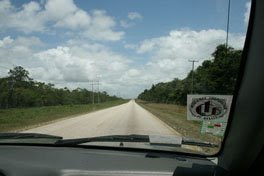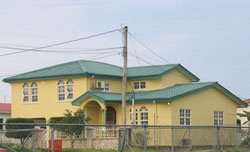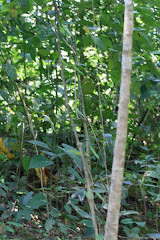Antoine, Michel’s son, came to visit us for the first time in Belize over Easter. When we drove back the 80 kilometers from the airport to Belmopan, I was carefully studying his face to see his first reaction to our new country. He kept quiet during the first 40 kilometers, and next he asked: “Papa, where are the houses? Where are the people?”
It’s true and especially remarkable to us coming from crowded Sri Lanka that Belize has only 300,000 people and consists mainly of  jungle. With a meager 12 persons per square kilometer, Belize is among the countries with the lowest population density in the world (bottom of the list is Greenland with less than one person per km2 and on top is Macao with more than 18,000 people per km2). We all know the problems associated with overpopulation in poor countries: the poverty, the pollution, horrible traffic situations, overstretched use of resources, devastating natural disasters… but have you ever thought about the opposite? Countries like Belize with low population and low GDP have their own set of problems.
jungle. With a meager 12 persons per square kilometer, Belize is among the countries with the lowest population density in the world (bottom of the list is Greenland with less than one person per km2 and on top is Macao with more than 18,000 people per km2). We all know the problems associated with overpopulation in poor countries: the poverty, the pollution, horrible traffic situations, overstretched use of resources, devastating natural disasters… but have you ever thought about the opposite? Countries like Belize with low population and low GDP have their own set of problems.
Evidently, the key problem lies in the use of resources. Take infrastructure. Belize has only two major roads (‘highways’) which are sufficient to connect all the cities and towns. The other roads are dirt tracks. Now there is money available from the EU to build new roads, but is it worthwhile to construct an expensive tarred road if only 20 cars are using it each day? In Belmopan, new cafés and restaurants open regularly but many disappear as quickly as they pop up for lack of clients. At Brodies, the only air-conditioned supermarket, I am often the sole customer; I don’t know how they survive. My friend Edna, a pediatrician at the Belmopan hospital, has an agonizing dilemma; should they purchase an expensive neonatal intensive care unit when they average only 30 babies delivered per month, most of whom are healthy? It is difficult to develop an underpopulated country, simply because there are too few people to utilize available resources.
But that is not the only challenge Belize as a low population country is facing. Recently, a twelve-year old boy accidentally witnessed a brutal assassination by a drug lord. Terrified, he did not want to testify. The Belize police came to his house over and over to pressure him into testifying. A few days later he was found murdered. Obviously, everyone saw the police at the boy’s house, but nobody could protect him. Witness protection, undercover police, officers in plain clothes; these concepts may have very well prevented this boy from being killed. But these things simply don’t work in a country where everyone knows each other.
The flip side of this is perhaps the consolation that it is practically impossible for prisoners to escape and disappear because everyone knows who they are...
 jungle. With a meager 12 persons per square kilometer,
jungle. With a meager 12 persons per square kilometer, 































No comments:
Post a Comment